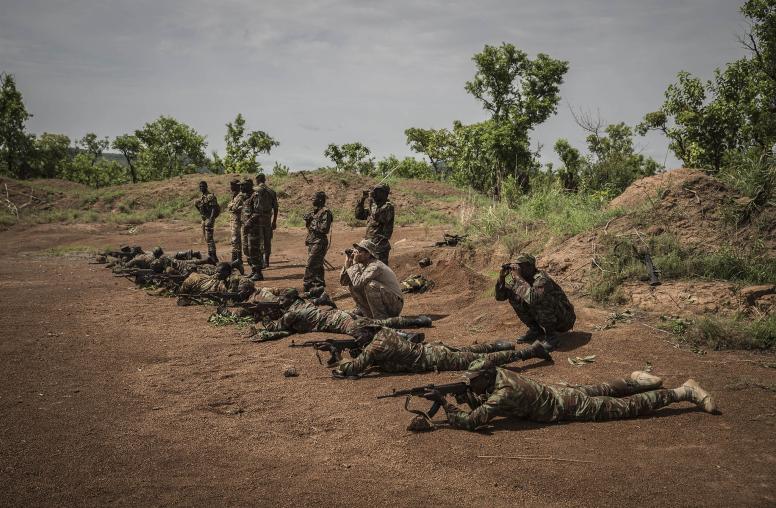From COVID to the Caliphate: A Look at Violent Extremism Heading into 2021
It is more important than ever that policy to counter violent extremism be driven by informed decision-making.
Heading into 2021, the violent extremist landscape is more diverse than at any previous point in the last two decades since the start of the U.S.-led Global War on Terrorism. While that effort was almost exclusively focused on combating violent extremist organizations motivated by Salafi-jihadism, there has been a universal recognition that other forms of extremism have proliferated. Many governments and states feel completely unprepared and underequipped to deal with these new forms of extremism, which include, but are not limited to, racially and ethnically motivated terrorism, terrorism inspired by extreme misogyny, left-wing terrorism, and the rapid spread of conspiracy theories.

At the 2020 RESOLVE Network Global Forum, we focused on looking beyond the horizon to identify new forms of violent extremism and how those will manifest in the future. Several themes in particular are worth highlighting when considering the complex nature of the violent extremism landscape: the continued threat posed by remnants of the Islamic State, the impact that the COVID-19 pandemic will have on violent extremism and terrorist groups, and concepts like cultural loss and other so-called grievance narratives that violent extremist organizations leverage for recruitment and propaganda.
Whither ISIS?
In late 2020, with the physical caliphate in ruins, ISIS continues to rebuild its network throughout Iraq and Syria, maintaining a steady operational tempo of attacks, and flush with enough cash to indefinitely wage a low-level campaign of sabotage, ambush, and terrorism for the foreseeable future. But even as the world might prepare to move on, it’s not that simple.
Thousands of fighters remain in prisons and detention camps, while tens of thousands of those who had previously lived among ISIS in camps like al-Hol are vulnerable to further extremism and radicalization with few countries eager to repatriate their citizens. It has never been more important for states to embrace the prospect of reintegration for promoting disengagement, while also recognizing the very real limits to reintegration and rehabilitation in the current political context, especially in the West. Yet despite the political challenges, the failure to reintegrate citizens will only fuel future radicalization and make it easier for terrorist and insurgent groups to recruit. By making citizens stateless, countries are effectively condemning them to become citizens of the Islamic State.
The Pandemic’s Impact
The COVID-19 pandemic has dominated the headlines in 2020 and impacted everyone’s way of life. Beyond the obvious, the second and third order effects of the pandemic might not always be apparent but can be insidious and corrosive in the short and long term. In Germany, far-right extremists have used the COVID-related lockdown measures to accelerate recruitment trends of neo-Nazis and white supremacists. COVID-19 has revealed an increasing lack of trust in expert systems, as well as a pervasive and growing sense of anomie. During COVID-19, there has been a drastic increase in both domestic violence and online child sex abuse, further contributing to a growing sense of lawlessness.
Terrorist groups have used the pandemic as a way to advance their own narratives. The coronavirus has served as a veritable buffet for actors across the ideological spectrum to push their extremists worldviews. Entering 2021, it remains likely that counterterrorism budgets will suffer, as funds are reallocated to deal with austerity measures and much-needed assistance to public health programs. Austerity and anxiety are a toxic combination, and could serve to fuel recruitment, especially for racially and ethnically motivated terrorists that seek to play off fears by advancing xenophobic and racist ideas related to the spread of COVID-19.
Grievance Narratives
Lastly, the concept of cultural loss is being manipulated by ideologues and extremists who seek to divide society along racial and ethnic lines. The concept of white genocide and the need to protect Western civilization and values while promoting a white ethno-state has fueled the global expansion of far-right extremists, including neo-Nazis and violent white supremacists. This concept has been pushed by terrorists such as Anders Breivik in Norway and Brenton Tarrant in New Zealand. The concept of cultural loss has been operationalized by violent extremists across North America, Europe, Ukraine, and Australia.
The manipulation of this concept is not limited to violent white supremacists and neo-Nazis. Throughout parts of Asia, including in India, Burma, Sri Lanka, and China, there is the challenge of dealing with the “majority with a minority complex.” The result has been anti-Muslim violence and campaign to harass, intimidate, and repress Muslims in these countries. Violent rhetoric enabled by social media has fueled acts of terrorism and extremism, at times enabled by governments and politicians.
The common thread running through all of these issues is the challenge posed by violent extremism, which is constantly changing and assuming new forms. Accordingly, it is more important than ever that policymaking related to countering violent extremism be driven by informed decision-making based on empirical evidence and sound data collection and analysis.
Colin P. Clarke is a member of the RESOLVE Network Research Advisory Council and a senior research fellow at The Soufan Center in New York City.



